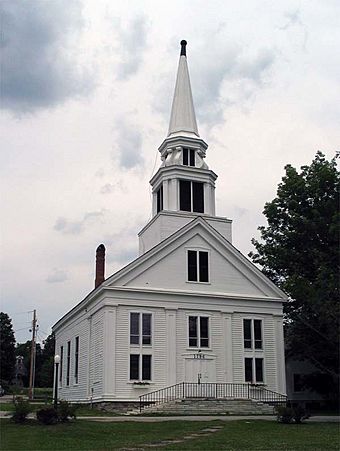Middletown Springs Historic District facts for kids
Quick facts for kids |
|
|
Middletown Springs Historic District
|
|
 |
|
| Location | East, North, South, and West Sts., Montvert Ave., and Schoolhouse Rd., Middletown Springs, Vermont |
|---|---|
| Area | 105 acres (42 ha) |
| Architectural style | Greek Revival, Italianate |
| NRHP reference No. | 85003239 |
| Added to NRHP | October 17, 1985 |
The Middletown Springs Historic District is a special area in the village of Middletown Springs, Vermont. It's like a time capsule, showing us what a small American village looked like in the mid-1800s. Many of its buildings have a unique style called Italianate architecture. This district was added to the National Register of Historic Places in 1985 because of its historical importance.
Contents
Exploring Middletown Springs' History
The town of Middletown Springs was settled a long time ago, even before the American Revolutionary War. It officially became a town in 1784. The very first house, a log cabin, was supposedly built here by a person named Luther Fillmore. The main roads in the village were set up to follow the compass directions, like North, East, South, and West.
How the Village Grew
The village was built near the Poultney River. This was important because the river's water power could run mills. These mills, like grist mills (for grinding grain) and sawmills (for cutting wood), were some of the first businesses in the area. They helped the village grow.
A Time of Growth and Change
In the 1850s, a local inventor named A. W. Gray developed a new kind of horse engine. This was a machine that used horses to power other equipment. His factory became very successful. This led to a building boom in Middletown Springs between the 1850s and 1870s. Many new houses were built, including some beautiful ones in the Italianate style.
Even though Gray's company slowed down after the 1880s (when new engines like the internal combustion engine came along), he also helped the village in another way. He developed the natural mineral springs in Middletown into a popular resort. This brought many tourists to the area in the late 1800s.
What You'll See in the District Today
The historic district is centered around where North, East, South, and West Streets meet. There's a village common (a public green space) at one corner and a cemetery at another. The district spreads out from this center, eventually blending into the surrounding farmlands.
There are 91 buildings in the district. Most of them are homes, usually one or two stories tall. They are mostly made of wood with overlapping boards called clapboards on the outside. Important buildings include the community church, which has a Greek Revival style. You can also see several fancy Italianate houses. The largest building is the school house, which has a Colonial Revival style.



